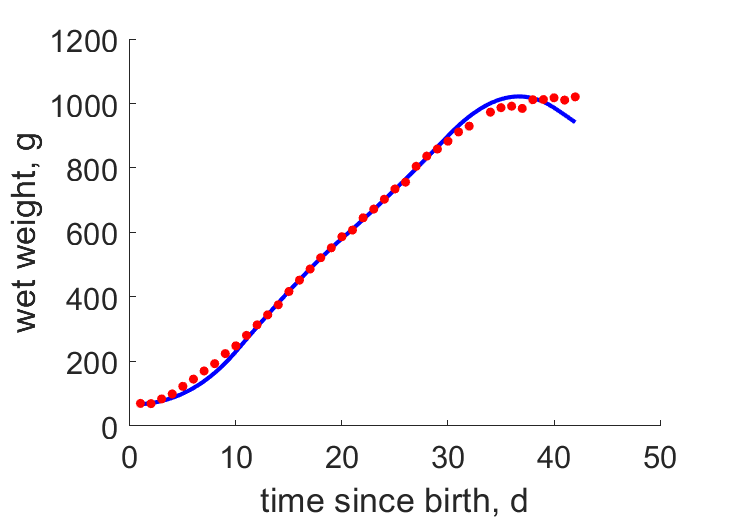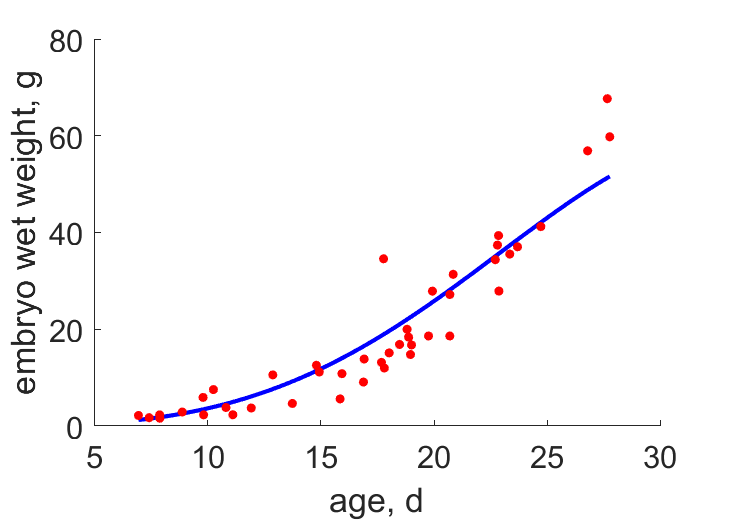Predictions & Data for this entry
| Model: std | climate: Cfb, Dfb, Dfc | migrate: Ms | phylum: |
| COMPLETE = 2.9 | ecozone: THp | food: biCvf, biCi, biSi, biSv | class: |
| MRE = 0.043 | habitat: 0iFe, 0iMm, biMc | gender: Dg | order: |
| SMSE = 0.012 | embryo: Tnsfm | reprod: O | family: |
Zero-variate data
| Data | Observed | Predicted | (RE) | Unit | Description | Reference |
|---|---|---|---|---|---|---|
| ab | 29 | 29.35 | (0.01212) | d | age at birth | SnowPerr1998 |
| tx | 37.5 | 37.56 | (0.001558) | d | time since birth at fledging | SnowPerr1998 |
| tp | 112.5 | 108.6 | (0.03474) | d | time since birth at puberty | guess |
| tR | 1095 | 1095 | ( 0) | d | time since birth at 1st brood | CramSimm1983 |
| am | 1.788e+04 | 1.798e+04 | (0.005198) | d | life span | TacuCrai2013 |
| Li | 59.5 | 59.95 | (0.007579) | cm | ultimate total length | SnowPerr1998 |
| Wwb | 67.5 | 66.35 | (0.01703) | g | wet weight at birth | ADW |
| Wwi | 1015 | 1055 | (0.03948) | g | ultimate wet weight for females | avibase |
| Wwim | 1147 | 1147 | (0.0003444) | g | ultimate wet weight for males | avibase |
| Ri | 0.008219 | 0.008118 | (0.01236) | #/d | maximum reprod rate | SnowPerr1998 |
Uni- and bivariate data
| Data | Figure | Independent variable | Dependent variable | (RE) | Reference |
|---|---|---|---|---|---|
| tW |  | time since birth | wet weight | (0.02523) | Spaa1971 |
| tWe |  | age | embryo wet weight | (0.2095) | Harr1964 |
Pseudo-data at Tref = 20°C
| Data | Generalised animal | Larus argentatus | Unit | Description |
|---|---|---|---|---|
| v | 0.02 | 0.04444 | cm/d | energy conductance |
| p_M | 18 | 482 | J/d.cm^3 | vol-spec som maint |
| k_J | 0.002 | 0.0202 | 1/d | maturity maint rate coefficient |
| k | 0.3 | 0.3065 | - | maintenance ratio |
| kap | 0.8 | 0.9402 | - | allocation fraction to soma |
| kap_G | 0.8 | 0.8009 | - | growth efficiency |
| kap_R | 0.95 | 0.95 | - | reproduction efficiency |
Discussion
- Feeding is slightly reduced towards end of nestling period
- Long tp cannot be captured by std model
- males are assumed to differ from females by {p_Am} only
- mod_3: tWw and Wwim data added, males different from females
Bibliography